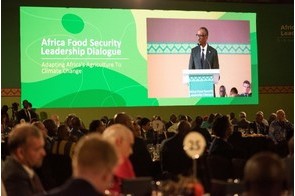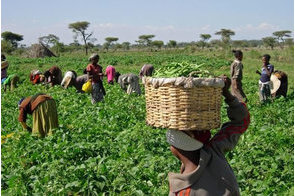Space technology can aid smart, precision farming – NASRDA

Summary
The Director-General of NASRDA said space technology will contribute immensely to research in modern farm practices.
Director-General of the National Space Research and Development Agency (NASRDA), Professor Seidu Mohammed, has said the application of space technology can promote smart and precision agriculture. He made this statement on Tuesday at the ongoing Annual Space Conference and Exhibition in Abuja.
The two-day conference, themed: Revolutionising Agriculture through Space Science and Technology Applications, is organised by the Centre for Satellite Technology Development (CSTD), one of the six activity centres of the NASRDA.
The NASRDA’s DG stated that it is pertinent for Nigeria’s space policy to be tailored to the country’s socio-economic situations so that citizens can benefit from space technology.
“Most of the Nigerian laws were gazetted in the 1950s and that was when the population of Nigeria was below 45 million,” said Mohammed. “Today, we are talking about 200 million; (and) the land has remained the same. Satellite is the tool we can use to acquire data and enable us to see the earth. We have to reach a compromise in terms of resources to use to create stability for the movement of herdsmen to avoid encroachment of farms.”
Regular geo-mapping of the environment will help in proper planning and reduce farmers and herders clash, he stated. The Director-General, also, emphasized that space technology will contribute immensely to research in modern farm practices.
According to the Director of CSTD, Dr Spencer Onuh, a nation that cannot feed itself would become a threat to its own sovereign existence.
“We believe that the merging of the space and agricultural sector will deliver what Nigeria needs,” said Onuh. “With the application of space science and technology, you can feed a nation not a family.”
Onuh also said the use of cutlasses and hoes for farming should be phased out and replaced with irrigation and mechanised farming using space technology.
“African countries need to employ effective economic agricultural practices, modern tools and innovative technologies in agriculture for high yield, and reduction of hunger,” the CSTD Director said, while also urging stakeholders to collaborate with the agency for the country to benefit from space technology.
In his keynote address, the founding Vice Chancellor of the Federal University of Agriculture, Umudike (now Michael Okpara University of Agriculture), Professor Placid Njoku, said the issue of precision farming is gaining grounds around the world because it helps determine the soil, the plants and it will help for a better output.
Precision farming enables farmers to optimise yield potential while reducing costs. The global precision farming market covers the entire industry on the basis of technology, hardware and software component, application, and geography. According to a new market research report published by MarketsandMarkets, the overall Global precision farming market will be worth $3.7 billion by 2018.
“We need to develop its applications and the packages that will enable the farmers to understand what is happening on his farm,” Njoku said.
Citing the success of the e-wallet, which enabled farmers to know the cost of fertilisers and where to get them, he said, “With space technology, we can educate the farmers on crops to plant, what to produce on their land, fertiliser to use, and also measure productivity of the farm.”
He, therefore, urged the Federal Government to provide three percent of the country’s consolidated revenue fund to the CSTD and NASRDA, annually. According to him, if the institutions are adequately funded, they would provide proper and timely information to the government.
Related
-
World Bank, AU, others commit to end hunger and malnutrition in Africa
The African Union signed a deal with four multilateral development organisations to adapt Africa’s agriculture to ...
-
Optimising wet period for dry season farming
Plans for 2024-2025 dry season farming should by now be underway by concerned ministries, including the ministry for ...
-
Leveraging co-operatives to boost market access for smallholders
There are over 1.2 million agricultural co-ops around the world working to ensure the welfare of farmers and their ...










